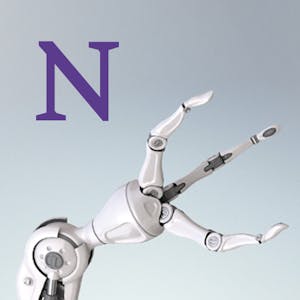This Specialization on Modern Robotics: Mechanics, Planning, and Control offers a comprehensive study of spatial motion and rigid body dynamics. Through six short courses, students will delve into fundamental mathematical modeling techniques and apply them to analyze, plan, and control robot motion. The course is structured to solidify students' understanding of the mathematics of robotics through practical application, including writing robotics software and testing it on a state-of-the-art cross-platform robot simulator.
The specialization encompasses a range of topics including robot configurations, kinematics, dynamics, motion planning, and control. The foundational material covers robot configurations for both serial robot mechanisms and robots with closed chains, configuration space (C-space), degrees of freedom, C-space topology, spatial velocities and forces, twists, wrenches, forward kinematics, velocity kinematics, statics, inverse kinematics, efficient numerical algorithms for forward and inverse dynamics, and robot motion planning and control. Advanced topics include robot manipulation, wheeled mobile robots, and mobile manipulation.
Certificate Available ✔
Get Started / More Info
This specialization comprises six short courses that cover foundational material in robot motion, kinematics, dynamics, motion planning, robot manipulation, wheeled mobile robots, and a capstone project on mobile manipulation.
In the Foundations of Robot Motion course, students will learn fundamental material regarding robot configurations, configuration space, spatial velocities and forces, and holonomic and nonholonomic constraints. The course builds on a library of robotics software and utilizes a free cross-platform robot simulator for practical application.
The Robot Kinematics course delves into solving forward kinematics, velocity kinematics, statics, and inverse kinematics using the product-of-exponentials formula. Students will apply their knowledge to calculate joint values and plan robot trajectories, building on the foundational material covered in Course 1.
In the Robot Dynamics course, students will learn efficient numerical algorithms for forward and inverse dynamics, as well as how to plan robot trajectories subject to dynamic constraints. This course is essential for simulation and robot control, further building on the foundational material covered in the previous courses.
Robot Motion Planning and Control introduces key concepts of robot motion generation, including planning a motion for a robot in the presence of obstacles and real-time feedback control. The course covers foundational material on motion planning techniques and robot control, providing practical knowledge for students to apply in their projects.
The Robot Manipulation and Wheeled Mobile Robots course delves into advanced topics such as modeling of kinematics and forces between rigid bodies in contact, analysis and planning of robot grasping and other manipulation tasks, and modeling, motion planning, and feedback control of omnidirectional and nonholonomic wheeled mobile robots. This course is essential for students interested in advanced robotics applications.
The Capstone Project on Mobile Manipulation integrates several topics from the specialization, including trajectory planning, odometry for mobile robots, and feedback control. Students will develop software to plan and control the motion of a mobile manipulator to perform a pick and place task, testing their software on a state-of-the-art robot simulator.
Welcome to “Engineering and Product Design Processes!” This short course will familiarize you with the steps, goals, and differences between engineering and...
L'Art des Structures 2 provides comprehensive understanding of trusses, beams, slabs, and frames in modern construction, enabling you to analyze, pre-dimension,...
Rigid Body Dynamics is a comprehensive course covering the principles of force, motion, and energy in mechanical engineering, with a focus on rigid body dynamics...
This specialization delves into semiconductor characterization, covering electrical, electron beam, ion beam, x-ray, and optical measurement techniques for semiconductor...